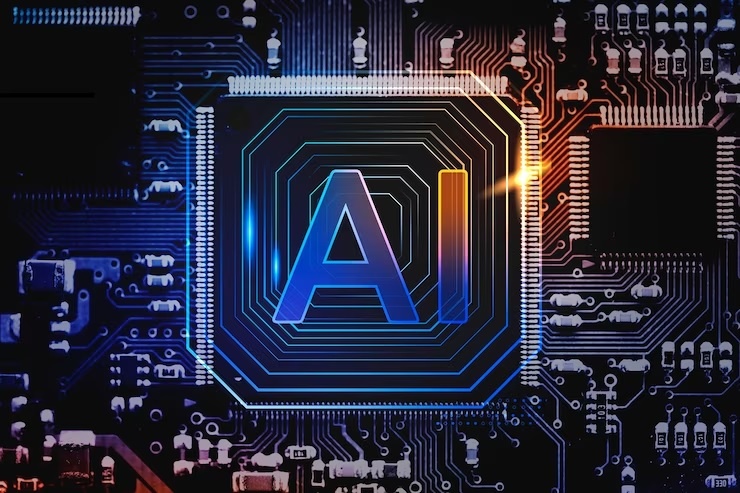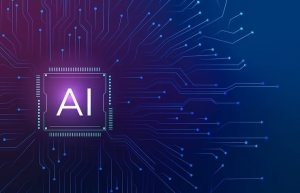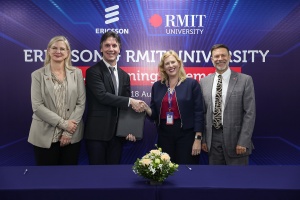Impacts yet to come in US-China tech spat
How serious are these new measures in terms of trade flows between the United States and China?
These measures are not yet implemented, as there is actually a rule-making process by the US Treasury Department. But those rules might be forthcoming.
The latest measures actually target investments in emerging advanced technologies, such as quantum computing and AI, which is complementary to previously announced export bans on things like high-tech manufacturing equipment and telecommunication equipment from Chinese providers like Huawei and ZTE.
As of now, it’s a narrow set of measures and the rules are not finalised, so it doesn’t seem like trade flows will be severely affected. However, it definitely could affect the active cooperation between the two largest economies and will definitely affect investment. Therefore, the order is actually severe, particularly in the current context.
 |
| Impacts yet to come in US-China tech spat, illustration photo/ Source: freepik.com |
What is the extent of Vietnam’s reliance on Chinese tech products and services affected by the US ban?
Vietnam has been relying on Chinese electronic imports, particularly at the height of the semiconductor cycle that came to an end in 2021.
Vietnam actually bought close to half of Chinese electronic imports. However, the proposed measures, at this time, don’t seem to impact Vietnam that negatively because trade flows are yet to be extremely affected.
Additionally, a lot of what’s specified in the order is emerging technologies. What is worth watching, though, is the final list of the products that will come out from the United States Treasury, particularly on the semiconductor side.
Once that is clear, it would give us a stronger sense of whether Vietnam will actually see a bigger impact with regard to its current reliance on Chinese electronic imports.
In the longer run, are there any economic consequences for Vietnam due to disruptions?
Yes, in the future, this is definitely something to be watched. One of the key things is how a lot of the electronics in Vietnam seem to be supplied by Chinese producers. In that sense, there could be the re-shaping of supply chains, should certain investment curves come true, and also how export then could evolve from the US.
All factors remain to be seen. But at this stage, what seems to happen increasingly is as cutting-edge technology becomes more mainstream, a lot of what’s included in this ban, which could be in place for a long time to come, could affect mainstream electronic products.
Therefore, Vietnam may have to find other suppliers that are not affected by the export ban, such as Japan, South Korea, and Taiwan. These could be the destinations where Vietnam could turn to with regard to its cheap equipment requirements.
What are your predictions for the evolving tech landscape, considering the ongoing tech ban and its potential ramifications?
What’s increasingly a buzzword in Vietnam is China+1, where companies are seeking to build robust supply chains. Vietnam is firmly in the midst of those discussions. Therefore, it seems Vietnam is increasingly attractive to foreign investors for offshore investments, particularly in semiconductors.
However, at this point, Vietnam is relatively at the low end of the semiconductor supply chain in East Asia. So what we could be seeing is the start of Vietnam’s climbing up of the value chain through the riding of the waves of where the current trends are going. And if there is the opportunity to do so, Vietnam could create various tech clusters, the likes of what we have seen in China, Japan, and South Korea.
This could create self-sustaining dynamics that could bring about good technology companies that actually come out of Vietnam.
 | AI chip giant Nvidia 'extremely likely' to invest in Europe The CEO of Nvidia on Friday said that the world's most valuable chipmaker is "extremely likely" to invest in Europe. |
 | EU, UNESCO to help developing countries shape AI rules The European Union will help fund a UNESCO scheme supporting developing countries as they create laws regulating artificial intelligence, the UN cultural body said Tuesday. |
 | 'Godfather of AI' urges governments to stop machine takeover Geoffrey Hinton, one of the so-called godfathers of artificial intelligence, urged governments on Wednesday to step in and make sure that machines do not take control of society. |
 | FPT Smart Cloud and Home Credit harness AI Innovation Lab Through the transformative power of the AI Innovation Lab, FPT Smart Cloud and Home Credit Vietnam have dramatically reshaped the financial sector's customer service landscape, achieving remarkable strides in operational efficiency, customer satisfaction, and employee workload reduction by harnessing the potential of AI and cloud applications. |
 | Ascend Vietnam Ventures leads $1 million funding for Singapore's AI edtech Cerebry Singapore-based AI-education startup, Cerebry, has announced a $1 million seed funding round to boost the reach of its AI-tutoring product for students and test-prep candidates in Vietnam and other Asian markets. |
 | Ericsson and RMIT University to establish AI Lab in Vietnam Ericsson and RMIT University have elevated their cooperation to a new height with an agreement signed on August 18 for the launch of the RMIT & Ericsson AI Lab at RMIT's campus in Hanoi. |
What the stars mean:
★ Poor ★ ★ Promising ★★★ Good ★★★★ Very good ★★★★★ Exceptional
Related Contents
Latest News
More News
- Hermes joins Long Thanh cargo terminal development (February 04, 2026 | 15:59)
- SCG enhances production and distribution in Vietnam (February 04, 2026 | 08:00)
- UNIVACCO strengthens Asia expansion with Vietnam facility (February 03, 2026 | 08:00)
- Cai Mep Ha Port project wins approval with $1.95bn investment (February 02, 2026 | 16:17)
- Repositioning Vietnam in Asia’s manufacturing race (February 02, 2026 | 16:00)
- Manufacturing growth remains solid in early 2026 (February 02, 2026 | 15:28)
- Navigating venture capital trends across the continent (February 02, 2026 | 14:00)
- Motivations to achieve high growth (February 02, 2026 | 11:00)
- Capacity and regulations among British areas of expertise in IFCs (February 02, 2026 | 09:09)
- Transition underway in German investment across Vietnam (February 02, 2026 | 08:00)

 Tag:
Tag:




















 Mobile Version
Mobile Version